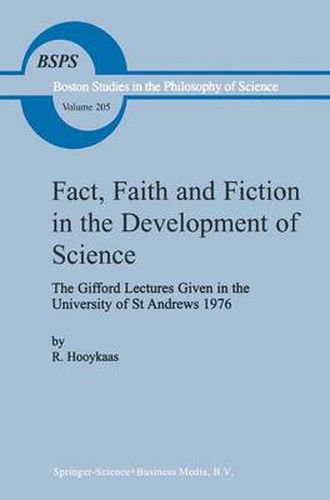Readings Newsletter
Become a Readings Member to make your shopping experience even easier.
Sign in or sign up for free!
You’re not far away from qualifying for FREE standard shipping within Australia
You’ve qualified for FREE standard shipping within Australia
The cart is loading…






In this posthumous book, the late Professor R. Hooykaas (1906-1994) conveys a lifetime of historical thought about modes of scientific advance over the centuries. In what variety of ways has the human mind, with all its subjectivity and its capacity for self-deception, but also its piercing gifts of discovery, managed to come to terms with “the whimsical tricks of nature’? Central to this erudite, penetrating, and widely ranging study is Hooykaas’s distinction between facts (given by nature yet entirely subject to our mode of interpreting them), faith (broad conceptions like the idea of order, of simplicity, or of harmony), and fictions in the sense of those daring intellectual tools, such as theories and hypotheses and models, which reflect the scientist’s creative imagination. Case studies drawn from the history of all branches of science (including chemistry and the earth sciences) and from Antiquity to the present day, serve to widen and to deepen the understanding of every reader (whether a historian of science or not) with a desire to learn more about the realities of the scientific pursuit.
$9.00 standard shipping within Australia
FREE standard shipping within Australia for orders over $100.00
Express & International shipping calculated at checkout
In this posthumous book, the late Professor R. Hooykaas (1906-1994) conveys a lifetime of historical thought about modes of scientific advance over the centuries. In what variety of ways has the human mind, with all its subjectivity and its capacity for self-deception, but also its piercing gifts of discovery, managed to come to terms with “the whimsical tricks of nature’? Central to this erudite, penetrating, and widely ranging study is Hooykaas’s distinction between facts (given by nature yet entirely subject to our mode of interpreting them), faith (broad conceptions like the idea of order, of simplicity, or of harmony), and fictions in the sense of those daring intellectual tools, such as theories and hypotheses and models, which reflect the scientist’s creative imagination. Case studies drawn from the history of all branches of science (including chemistry and the earth sciences) and from Antiquity to the present day, serve to widen and to deepen the understanding of every reader (whether a historian of science or not) with a desire to learn more about the realities of the scientific pursuit.